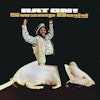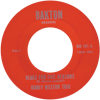Jerry Williams Jr. had the freedom to reinvent himself in 1970, since hardly anyone knew who the hell he was. He’d been gigging around the soul circuits since the mid-’50s but was forever an opening act. So he rechristened himself, and by ’71, he was recording his second album as Swamp Dogg. Sadly, that album—Rat On!—is remembered mostly for its bizarre cover. “I think people bought the album, threw the fuckin’ record away, and kept the cover,” Swamp says. “I thought of the white rat idea because, first, I wanted to be nekkid on an elephant, but I didn’t know where I was going to get an elephant from. The whole idea was the balled-up fist, ‘Right on,’ and due to the fact that I had a little rat, I called it Rat On! But when I got it to Elektra, it was kind of, ‘Is this a Black and White thing?’ And right away, my mind says, ‘Yeah! It’s a Black man finally on top.’”
Rat On!, recorded at Muscle Shoals, contains some of Swamp’s strongest songs, as well as the tendencies that kept him out of the mainstream. There is the sharp political commentary of “Remember I Said Tomorrow” and the controversial standout “God Bless America, For What.” “Elektra just called it ‘God Bless America,’” he says. “They didn’t like it. I remember when we went to play the Washington Monument, we had orders into D.C. for over 100,000 records, and Elektra forgot to ship them. They let the album peter out.” Then there are the songs about offbeat subjects, sung from uncommon perspectives—songs like “Creeping Away,” about cheating on one’s wife, and “Got to Get a Message to You,” sung from the perspective of a man about to be killed for murdering his lover’s husband.
Even with its unusual subject matter, the music cooks with help from the Muscle Shoals rhythm section. “I am the one who put the Muscle Shoals horns together,” Swamp says. “I didn’t realize it—I just brought in a bunch of guys that I liked the way they played together.”
The result is classic soul sung by a man who was in the process of discovering himself. “It took me a long time to figure out who Swamp Dogg really was after the Rat On! album,” he says. “But I knew that Swamp Dogg was a person who did what he felt, not what somebody else dictated. That’s the road I’ve traveled, and I’m still on the son of a bitch.”


